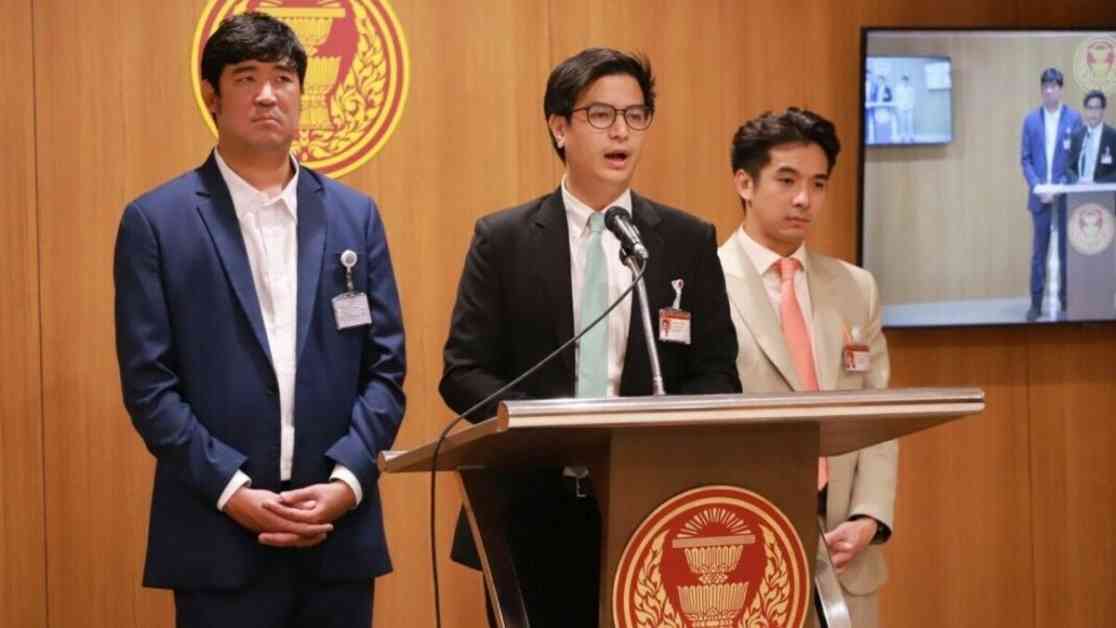Thai MPs Advocate for New Constitution Following Prime Minister Srettha’s Removal
In a recent turn of events in Thai politics, the Constitutional Court’s decision to remove Srettha Thavisin from the position of Thai Prime Minister has sparked calls for a new constitution among Members of Parliament. Parit Wacharasindhu, a Member of Parliament from the People’s Party, expressed concerns over the ruling, stating that his party disagrees with the decision. He emphasized that while political leaders should uphold ethics and integrity, the interpretation of ethics can be subjective. Parit argued that ethical matters should be judged by the public rather than being monopolized by the Constitutional Court and independent bodies to prevent an imbalance of power.
The People’s Party views Srettha’s ouster as a signal for the urgent need for a new constitution and a review of the powers held by the Constitutional Court and independent agencies. Parit stressed that ethical standards should be considered a matter of political responsibility, and his party is committed to pushing for changes that will benefit the public. The recent court decisions, including Srettha’s case, have raised questions about the role and powers of the Constitutional Court. Parit suggested that a constitutional amendment is necessary to review these powers and ensure they are appropriately balanced.
Discussions were reported to be underway at the Pheu Thai Party headquarters following the removal of the Thai premier. Party members and coalition partners were deliberating on who would take on the role of the 31st Prime Minister. Pheu Thai has proposed Chaikasem Nitisiri as a prime ministerial candidate to assume the position while maintaining the current ministerial quotas for coalition parties to ensure continuity in governance. Paetongtarn Shinawatra, the leader of Pheu Thai, is reportedly not ready to take on the role of Prime Minister.
Pheu Thai is scheduled to hold a meeting at the Parliament building to further discuss the appointment of the new Prime Minister. In a related development, the Secretary-General of the House of Representatives announced that the parliamentary session originally scheduled for a later date has been cancelled in favor of a special session to consider the approval of the new Thai Prime Minister, as outlined in the Constitution of Thailand.
Calls for a New Constitution
The call for a new constitution in Thailand comes as a response to the recent political developments following Prime Minister Srettha’s removal. Members of Parliament, particularly from the People’s Party, have voiced their concerns over the ruling by the Constitutional Court and highlighted the need for a more balanced approach to ethical matters in politics. The push for a new constitution aims to address the perceived imbalance of power and review the authority of independent bodies such as the Constitutional Court.
Importance of Ethical Standards
Ethical standards in politics have become a focal point of discussion in Thailand, especially in light of recent court decisions and the removal of the Prime Minister. Parit Wacharasindhu emphasized that ethical matters should be considered a matter of political responsibility and that the public should have a say in judging ethical conduct. The People’s Party’s advocacy for a new constitution aims to ensure that ethical standards are upheld and that political leaders are held accountable for their actions.
Deliberations for the New Prime Minister
Following the ouster of Prime Minister Srettha, discussions have been ongoing at the Pheu Thai Party headquarters to determine the next Prime Minister. Chaikasem Nitisiri has been proposed as a prime ministerial candidate by Pheu Thai, with the aim of maintaining continuity in governance by keeping the current ministerial quotas for coalition parties unchanged. The decision-making process for the new Prime Minister underscores the importance of stability and continuity in Thai politics during times of transition.
Parliamentary Session Update
In a related development, the cancellation of the originally scheduled parliamentary session signals a shift in focus towards the approval of the new Thai Prime Minister. The special session scheduled to consider the appointment aligns with the constitutional process outlined in Thailand’s legal framework. The decision to hold a special session reflects the urgency of appointing a new Prime Minister and ensuring a smooth transition of power in the government.
Conclusion
The call for a new constitution in Thailand following the removal of Prime Minister Srettha Thavisin reflects the ongoing challenges and discussions surrounding ethics, integrity, and balance of power in Thai politics. Members of Parliament, including those from the People’s Party and Pheu Thai, are actively advocating for changes that will benefit the public and ensure a more transparent and accountable political system. As deliberations continue for the appointment of the new Prime Minister, the focus remains on maintaining stability and continuity in governance while addressing the need for ethical standards and a balanced approach to political decision-making.




















